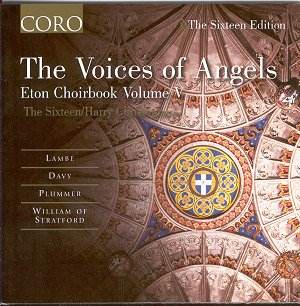Originally released on Collins 14622 this 1995 recording
was Volume 5 in The Sixteen’s Eton Choirbook series. Few but superlatives
are in order from the booklet to the sound quality, from the repertoire
to the performances, from the sensible introductory material to the
full texts and translations. Coro is The Sixteen’s own new label, an
edition which is drawing on its extensive catalogue of recordings, each
disc containing a preface written by Harry Christophers himself.
This disc shows convincingly how accelerated was the
advance in early Tudor music, how unlike their continental contemporaries
were the English composers of that generation and how abundantly complex
and dense was the style cultivated by the greatest of the musicians
here, the remarkable Richard Davy. His Salve Regina is freely composed,
without plainchant, the declamatory floridity of the writing a real
challenge to the choir, lower voicings strong, independent and powerful,
the increasing complexity of the writing reaching to the high voices
as well, the sonority one of the utmost depth and plangency. The extensive
In Honore Summae Matris has some florid internal parts, with a line
quivering with amplitude, with occasional recourse to high and low oppositionally
pitched voice parts and a beautiful forest of complex, almost quasi-melismatic
profundity. Walter Lambe’s exquisitely discursive but massively accomplished
Salve Regina makes a feature of fluidity and flux with lines coming
and going, voices magically withdrawn, both in terms of volume and tone.
The composer known as William Monk of Stratford probably served at the
Cistercian Abbey of Stratford-atte-Bowe in Essex. His Magnificat was
specifically set for men’s voices and not for boys. Undated, accomplished,
tending to a kind of passionate severity it’s his sole surviving work
and beautifully performed here. John Plummer wrote rather earlier than
the other composers here. He is expert in his idiosyncratic way at allocating
melody lines to a few voices. His apparent simplicity – a strange stasis
– never entirely masks a wonderful kind of reflective and emotive intimacy
as he contrasts full with smaller voice "blocks" to optimum
effect – most notably in Tota Pulchra est. In his Anna Mater Matris
Christi he appears like a cool bath after Davy’s gorgeously entwined
Salve Regina – Plummer emerging sparse, not ascetic, but spare, contained,
not without flourishes and theatricalities of his own but with an aesthetic
significantly more withdrawn than the later, more obviously outgoing
Davy. Who would want to be without either?
Such care, beauty of tone and thoughtfulness have been
lavished on this disc that further recommendation is rather redundant.
These are great works, superbly performed.
Jonathan Woolf


